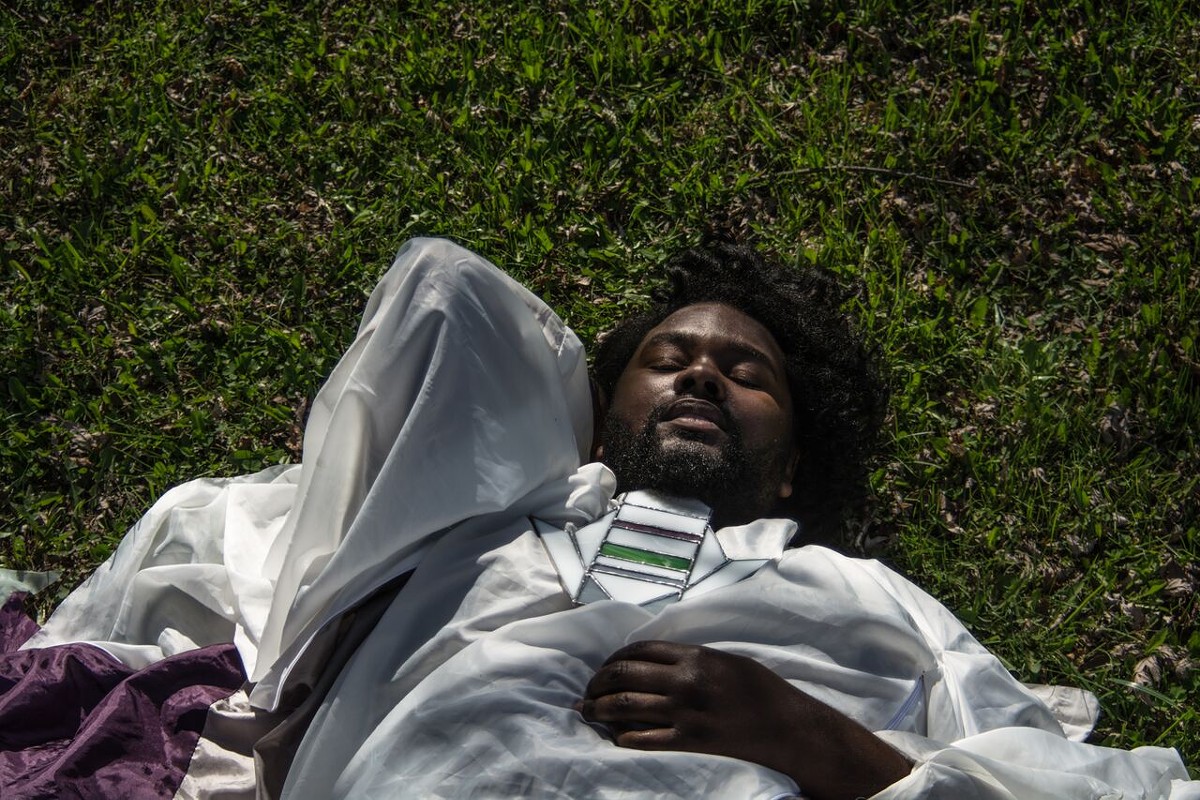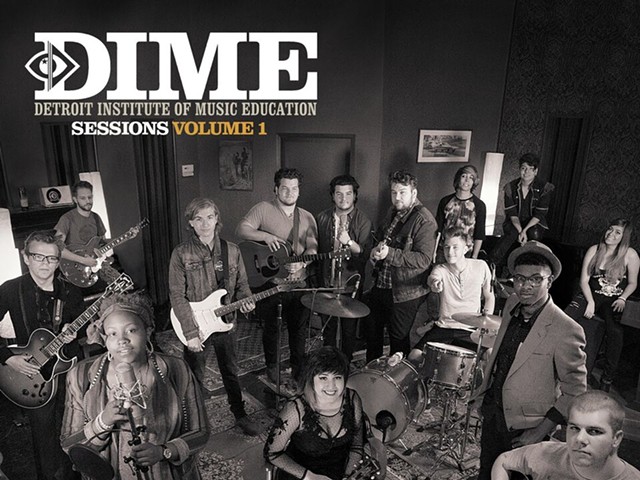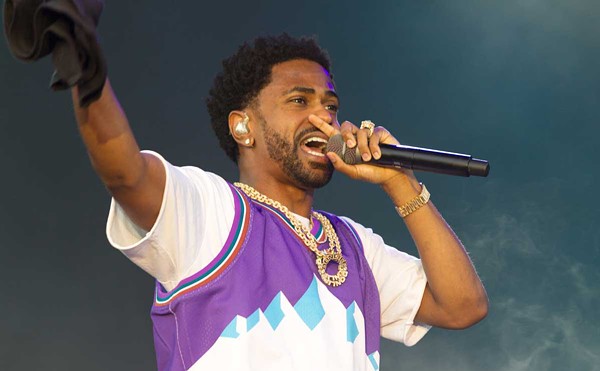Tunde Olaniran is an experimental pop artist from Flint. Not only is he a talented producer, singer, and rapper, but he is also a choreographer, designer, and author of fiction known for his high-energy and theatrical performances. He's also an activist, and works as an educator for Planned Parenthood.
We've profiled Olaniran before — most recently in our inaugural "People" issue June 10 — but we had to devote more ink to him here, as next week sees the release of his long-awaited debut full-length, Transgressor, (Quite Scientific), following 2014's Yung Archetype EP. Transgressor is bursting at the seams with soaring vocals, skittering percussion, earworm hooks, and intelligent and witty lyrics. It is at once playful yet serious, emotional yet danceable. Pay attention, because it's sure to be one of the most compelling releases this year, and will likely wind up on many critics' year-end lists. Olaniran's already been raved about in The New York Times, Pitchfork, Entertainment Weekly, Stereogum, and Noisey.
Transgressor is his most ambitious work, and it really feels like a statement of purpose. "It's better than anything I've done before," Olaniran says. "It feels complete. The concept of transgression in general has always been really interesting to me. The idea that someone does something that violates any kind of rules or unspoken law, and how people react to it."
Olaniran has spent much of the last year writing and recording the album. "Eighty percent of it was me coming up with the production in Fruity Loops at home, putting it together, exporting the tracks, taking it to John Zott, my engineer, and mixing it in Pro Tools," he says. "Then writing, and then recording the vocals at his place. And then we'll go back and add some things or change some things. I tried to be really demanding of myself with the production."
Surprisingly, Olaniran says he spends the least amount of time on the lyrics. "Everything else I'm very particular about, but the lyrics I kind of just let come out," he says. "I don't know what I'm writing about sometimes until it's done.
"I have a traditional song structure, but I like to make it a little more interesting, play around with different sounds and also make the content a little different. I don't like monotonous stuff. I just get bored easily. Sometimes I'm like, 'How would Kate Bush sing this? How would Missy Elliott approach this? How would Björk sing this?' How do I want to feel, what's the right approach? Sometimes I have the Swiss army knife approach to a song. What's the right energy for it?"
We sat down with Olaniran to talk about all 12 songs on the album.
'"Trangressor' is the title track. I wanted it to feel really triumphant and hopeful. It was my first time doing gang vocals, so I just wanted it to sound like a room full of kids having a great time. I really wanted to just attack it and go for it vocally, and really let people know I am a singer first, not a rapper. Also the production's one of my most favorite because it's simple but it's deep and powerful."
The album starts off with a sample Olaniran found online. "It's a girl in West Africa, a song she's singing to grind millet, like a work song. The whole sample she's laughing and giggling, and that's how I want it to feel. Transgression doesn't necessarily mean you're fighting this dark bloody battle against the forces of evil, but it can be really joyful too. It's work, but you can have a smile on your face and break certain barriers. It was so perfect."
"'Let Me Go' was co-produced by Seth Anderson of Flint Eastwood. He sent me this and I was like, 'This is beautiful.' It was my chance to have something slower. There's still a kick to it, some sense of danger, but it's really a melancholy sweet song."
The chorus features the lyrics "Once upon a time I was yours, you were mine/ You had me hook, line, and sinker." Olaniran says the chorus was "totally random," but the song is about his relationship with his father. "One moment I had is actually with my dad. I feel like there's some things he's working out. It was really saying, 'When you figure out whatever you have to figure out then we can have a better relationship.'"
"'Keep Your Body Moving' was the first song I wrote after Yung Archetype for the record. And it's a mess. Every possible thing is in that track. We went through probably four or five versions before we figured out the right one. I wrote that as an idea of movement and movement building. And I wanted to focus on forward movement, whether it's physical, whether it's strategic, whether it's emotional, whether it's a relationship, whether it's a larger movement. So I wanted something really like, fists in the air, but with a groove and aggressive.
"The Allied Media Conference has a party every year. And the idea that you spend a week or a weekend sharing stories from different movements, having network gatherings, having strategy sessions, learning from each other — but then everyone meets on the dance floor. I was thinking, 'What should that song be like?' Because you meet people and you get to know them, but you come to love each other when you're celebrating. You can't do that in a workshop. You just have to move with the people you're with, and it's like you're moving through grief. You're moving through pain, you're moving through it. I don't want to beat people over the head with a message like that. I don't want it to feel like a lesson. But I do want to be inspired by stuff that matters to me."
"'Namesake,' again co-produced with Seth Anderson. That song is really like beginning to end of my life so far. I just wanted to write a song that felt autobiographical. It's messy, it's all over the place. Figuring out how I want to exist in the world, that's what 'Namesake' is about. To me, it's like one of the more radio-friendly songs in a lot of parts. I'm gonna be working on the next record this year and ['Namesake' is] where I'm headed."
"'Up and Down' is just about being fat. I have my own relationship with my body and I want to not feel imprisoned by it. I want to not feel like I have to wait for another body to come along before I can do what I want to do. That song is really like my fat activism song. That's a concept that people do not necessarily understand, but to me it's powerful."
'"Everyone's Missing' is dope. That song has a long story too. I held a science-fiction writing workshop. It was in Flint and a lot of people in the workshop wrote about loss. They wrote about someone who died or that was no longer there, or people that left. Also being in Flint and people leaving the city — leaving you. We wrote that song as an acoustic song at first and then I added it to the album because I thought that the concept was so powerful. Then I wrote a rap right around the Eric Garner verdict. It was an extension of the theme, but it was kind of thinking about our relationship to bodies and how violent we are in this country with certain kinds of bodies. So all that's in there."
"'Run to the Gun' is about violence too. But I took on different perspectives and different narrative viewpoints. I think in this country, violence in all its forms is our first response. And whether it's very punitive policies is our first response, or imprisonment is our first response, it's challenging to get past that point with a lot of people. But then in the production I wanted to approach it like an old-school Missy Elliot/Timbaland collab. So I listened to 'Get Ur Freak On,' I listened to a lot of old Missy. I wanted changes. I wanted it to feel real dank and the percussion's really important. I tried to be really demanding of myself with the production.
"I ended up resequencing a lot of it, 'cause I was like, 'This is boring.' That's the song I'm most proud of the production on. It has kind of a dancehall vibe as well and there's a lot of parts that you can sing along with too. So again, that's a way of talking about something that can be really challenging but have it be in a song that makes you want to dance or nod your head."
"I wrote 'Don't Cry (ft. Invincible)' working on a project in Flint. Half of it was community engagement and half art. You find a lot of projects where people get grants who have no business running a project or working with people, but they have this pot of money that they're controlling and you have to work with this ridiculous person.
"So it was that situation, I was working with someone who had that role, and I don't want to curse this person out in a meeting. I'm just gonna write a song and vent how I'm feeling. Then that'll be good, because I can just have my song and it's fun. I don't have to yell at them about anything and we can just keep it moving. Luckily, I'm cool with that person, it's not an issue, but that's like my therapy song. It's the first and only time Invincible and I have collaborated on wax, so it's special to me too. I really appreciate them, and I think a lot of amazing beautiful stuff has flowed from that friendship."
"Palladin": "I went to my cousin's wedding in London, and when I came home my grandmother called me and she was really upset. She was like, 'A lot of your cousins are telling me that you're gay because you have long hair, and they went on Facebook and saw that you were hugging men in your pictures' and I'm just thinking, 'What?!' And I had this moment where it's like, 'Fuck you, first of all, because we've met once, and you're calling my grandmother from stalking my social media account.' First of all, I had to deal with my grandmother. There's nothing wrong with being gay, you shouldn't be freaking out about that; that has nothing to do with anything. But also I had never had to be part of a rumor mill like that. In Nigerian culture, people gossip a lot, but I had never been a part of that because I'm like, the American cousin.
"And then I remember posting something after Boko Hiram kidnapped all of those girls from Nigeria. I was like, 'I'm conflicted because you as a country voted for violence against LGBT people, but I'm supposed to be concerned about your family? Would you care if they were gay and they were kidnapped?' So that was very upsetting for me, especially having experienced this rampant weird homophobic thing. And I had random Nigerian people messaging me being like, 'Who do you think you are?' So I was like, 'I'm gonna write a song about this.' It was so ridiculous how self-righteous people are. Literally because I have long hair — it seemed so silly. So the production's kind of fun and silly. You're holding a cross, and you're misinterpreting the word that you follow, that's what the song is really about. It was precipitated by that incident [with my family], but also about not even understanding your own religion in a way and your own scripture."
"Diamonds ft. iRAWniQ & Passalacqua": "We have this ordinance in Flint where they were trying to make it illegal to panhandle. We think of poor people or homeless people as one thing, but really they're active and doing stuff, they're not just laying on the ground somewhere. 'So you're in your fucking car and you just left Bed Bath & Beyond, why do give a shit if someone is standing on the side of the road? Who cares? Why do you give a shit?' So, that song was about economic justice and being broke, but also how we hate poor people in this country and that specific instance in Flint. That chorus was much older, but the verses were more centered around current issues. There's so many bigger things we could be worrying about than some person with a cardboard sign."
"'Brighter Days' is my second favorite song. It's talking to myself about looking another way or turning a blind eye when there's issues you should be focusing on. Hoping maybe it'll get resolved and maybe I don't need to get involved. Trying to get away from something rather than fix it. That can relate to personal things, like relationships, things at work, things in my career, but also things in my city, where seeing people be like, 'Well I'm getting out of here. I can't deal with it.' Or 'I'll be dead so why worry about this environmental thing?' So that's the general idea, but the song is really one of my favorite productions too. There's moments that go deep for me emotionally, but also some of the synths we chose, and having live viola and live banjo and live guzheng, which is like a Chinese harp."
'"24KT is the companion piece to 'Transgressor.' It touches on all the themes on the album, but I wanted to end on a really uplifting, joyous note — 'My hand extended, now we're both ascending. Let's move forward together. There's a lot more that we can do, but if we do it together, it will be more fun and full of love and joy.' That was the last production we finished, and it was like 8 a.m., and I think John [the engineer] probably thought I was losing my mind."
About what he hopes people will take away from the album, Olaniran says, "I want people to get that there are lots of voices in music that don't have to sound like everything else. You can have something that's good that's not cookie cutter. There are people who are black, who are male, who are doing things that are very different and that's OK. I want people to react to it to how I reacted to hearing MIA for the first time, really opening up your mind to how you can put something together musically. 'Cause for me, that's always the most gratifying is when an artist is like, 'I'm really gonna approach something differently' after seeing you perform.
"I want you to be able to get crunk as fuck to it, but also it's not problematic. You can enjoy it, and you can turn up or have a party but it's not degrading or oppressing someone."
Tunde Olaniran performs with special guests Little Animal, Ris Anderson, and Bevlove at a Transgressor album release show Saturday, Aug. 8 at the Elizabeth Theater, 2040 Park Ave., Detroit; $8 advance tickets, $10 day of show.






